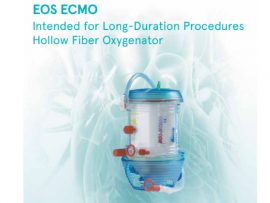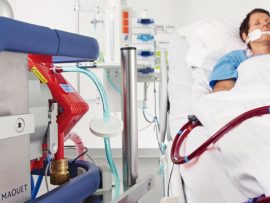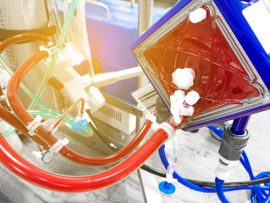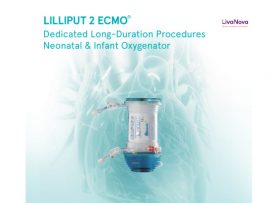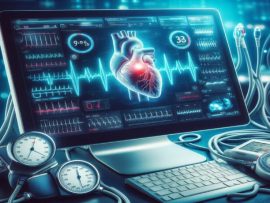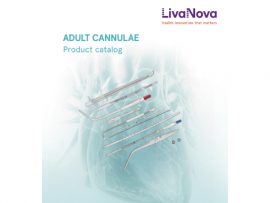Abstract Acute poisoning may lead to life-threatening conditions that require advanced life support, such as extracorporeal membrane oxygenation (ECMO). Data about the use of ECMO in intoxications and overdose are..
Lee masAbstract Background Veno-Arterial Extracorporeal Life Support (VA ECMO) is a critical intervention for patients with cardiogenic shock, serving as bridge to recovery, transplantation, or long-term therapies. The complexity of VA..
Lee masAbstract Background Preliminary evidence from small, single-center studies suggests levosimendan may improve the likelihood of successful venoarterial extracorporeal membrane oxygenation (VA-ECMO) weaning in patients with cardiogenic shock. However, the literature..
Lee masAbstract Sickle cell disease (SCD) is associated with substantial morbidity and early mortality in afflicted adults. Cardiopulmonary complications that occur at increased frequency in SCD such as pulmonary embolism, pulmonary..
Lee masAbstract Venopulmonary ECMO (VP ECMO) is an advanced support strategy for patients with severe respiratory failure and right ventricular (RV) dysfunction, providing pulmonary protection by oxygenating blood and unloading the..
Lee masAbstract Background The impact of intra-aortic balloon pump (IABP) on survival and successful bridging to heart replacement therapies (HRT) in patients with heart failure–cardiogenic shock (HF-CS) remains unclear. Objectives The..
Lee masAbstract Background The use of venoarterial extracorporeal membrane oxygenation (VA-ECMO) as a cardiocirculatory support has tremendously increased in critically ill patients. Although fluid therapy is an essential component of the..
Lee masAbstract Extracorporeal membrane oxygenation (ECMO), an advanced life support method, was developed to treat severe cardiac and pulmonary failure in critically ill patients. ECMO was previously used to treat ARDS,..
Lee masAbstract Extracorporeal life support (ECLS) has become increasingly common in the United States to manage refractory cardiopulmonary failure and has been used in complex populations including pregnant women. Application of..
Lee masAbstract The use of venoarterial extracorporeal membrane oxygenation (VA-ECMO) for temporary mechanical circulatory support in various clinical scenarios has been increasing consistently, despite the lack of sufficient evidence regarding its..
Lee masAbstract Background The impact of intra-aortic balloon pump (IABP) on survival and successful bridging to heart replacement therapies (HRT) in patients with heart failure–cardiogenic shock (HF-CS) remains unclear. Objectives The..
Lee masAbstract Background: Venoarterial extracorporeal membrane oxygenation (VA-ECMO) is increasingly used to treat cardiogenic shock. However, VA-ECMO might hamper myocardial recovery. The Impella unloads the left ventricle. This study aimed to..
Lee masAbstract Electrocardiogram (ECG)—synchronized pulsatile veno-arterial extracorporeal membrane oxygenation (V-A ECMO) is a recent development in extracorporeal therapy for patients with severe cardiogenic shock. Although preclinical studies have shown benefits of..
Lee masAbstract Human serum albumin (HSA) is a non-glycosylated, negatively charged, single-chain polypeptide composed of 585 amino acid residues with a relative molecular mass of 66.438 kD. It is synthesized by..
Lee masAbstract Background Extracorporeal membrane oxygenation (ECMO) as rescue therapy for cardiogenic shock (CS) is highly dependent on timeliness and medical resources. Objectives Aimed to assess ECMO management and outcomes in..
Lee masAbstract Cardiogenic shock (CS) is a critical condition with high mortality, characterized by reduced cardiac output (CO) and tissue hypoperfusion, despite advancements in treatment. Traditional hemodynamic markers like CO measurements,..
Lee masAbstract We read with great interest a recent article on the association between body mass index (BMI) and outcomes in patients supported by venoarterial extracorporeal membrane oxygenation (VA-ECMO). In a review..
Lee masAbstract Venovenous (VV) extracorporeal membrane oxygenation (ECMO) supports end-organ oxygen delivery in patients with refractory respiratory failure. Physical therapy (PT) while on ECMO provides conceptual benefits of strength and conditioning...
Lee masAbstract Aims Knowing the upper time limit for successful weaning from temporary mechanical circulatory support in cardiogenic shock will help with decision‐making regarding advanced heart failure (HF) therapy or considering..
Lee masAbstract The use of extracorporeal membrane oxygenation (ECMO) has emerged as a rescue intervention for hemodynamically unstable patients and prophylactic intraprocedural hemodynamic support in the cardiac catheterization laboratory. The prompt..
Lee masAbstract Cardiogenic shock (CS) is associated with significant mortality. Advances in pharmacological therapies and mechanical circulatory support (MCS) devices have markedly improved the therapeutic approach to CS, though treatment efficacy..
Lee masAbstract Extracorporeal Membrane Oxygenation (ECMO) is a modality of extracorporeal life support which allows temporary support in cases of cardiopulmonary failure and cardiogenic shock. This study presents a valveless pump..
Lee masAbstract Objectives Cardiac surgery–associated acute kidney injury (CSA-AKI) is a common complication with high morbidity and mortality. This study was designed to determine whether adding human albumin to the cardiopulmonary..
Lee masAbstract Cardiogenic shock represents a critical condition in which the heart is unable to maintain adequate circulation leading to insufficient tissue perfusion and end-organ failure. Temporary mechanical circulatory support offers..
Lee masAbstract Background Postcardiotomy cardiogenic shock (PCCS) in cardiac surgery is associated with a high rate of morbidity and mortality. Beside other therapeutic measures (e.g. intraaortic balloon pump (IABP)), extracorporeal life..
Lee masAbstract Mortality remains elevated during venoarterial extracorporeal membrane oxygenation support (VA-ECMO) for cardiogenic shock and the role of inflammation is uncertain. By using the neutrophil-to-lymphocyte ratio (NLR), we investigated inflammatory..
Lee masAbstract Background Acute lung injury and acute respiratory failure are frequent complications of cardiogenic shock and are associated with increased morbidity and mortality. Even with increased use of temporary mechanical..
Lee masAbstract In recent years, there has been an increased utilization of temporary mechanical circulatory support (tMCS) in patients with cardiogenic shock (CS), with many transitioning to recovery or advanced therapies..
Lee masAbstract Background Veno-arterial (V-A) extracorporeal membrane oxygenation (ECMO) is commonly used for patients with cardiac arrest, cardiogenic shock, or heart failure and is a life-saving technique. Computed tomography angiography (CTA)..
Lee masAbstract Background Left ventricular unloading is needed in patients on extracorporeal life support (ECLS) with severely impaired left ventricular contractility to avoid stasis and pulmonary congestion, and to promote LV..
Lee mas
